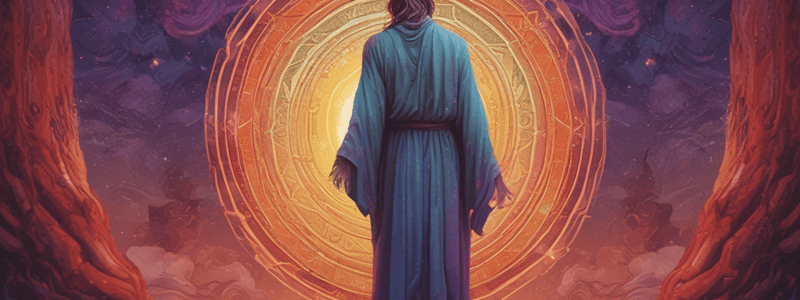Podcast
Questions and Answers
What aspect of religious experience does Rudolf Otto emphasize as important?
What aspect of religious experience does Rudolf Otto emphasize as important?
- The recognition from the experience
- The reasons behind the experience
- The emotional response to the experience
- The consequences of the experience (correct)
How is spirituality differentiated from spiritualism?
How is spirituality differentiated from spiritualism?
- Spirituality involves communication with the dead
- Spirituality is a belief in spirits existing independently
- Spiritualism is solely focused on personal growth
- Spiritualism deals with survival of the personality (correct)
Which of the following best describes the nature of religiosity?
Which of the following best describes the nature of religiosity?
- It is man-made, external and visible (correct)
- It transcends traditional beliefs and rituals
- It is internal and invisible
- It is focused solely on personal experiences
What does the term 'embodied spirits' imply?
What does the term 'embodied spirits' imply?
According to Sawan Ashram, what does spirituality aim to achieve?
According to Sawan Ashram, what does spirituality aim to achieve?
Which of the following statements is true regarding the relationship between spirituality and religion?
Which of the following statements is true regarding the relationship between spirituality and religion?
What is a common misconception about spirituality?
What is a common misconception about spirituality?
What results from combining spirituality and religiosity, according to the content?
What results from combining spirituality and religiosity, according to the content?
What aspect of mesmerism is noted in the content?
What aspect of mesmerism is noted in the content?
Which term describes the practice of communicating with spirits of the deceased?
Which term describes the practice of communicating with spirits of the deceased?
What is one key characteristic that distinguishes religious experience from normal experiences?
What is one key characteristic that distinguishes religious experience from normal experiences?
Which definition is provided for the term 'religious' as discussed in the content?
Which definition is provided for the term 'religious' as discussed in the content?
What does the word 'experience' imply according to the given content?
What does the word 'experience' imply according to the given content?
How does the content suggest modern society views religious experiences compared to previous times?
How does the content suggest modern society views religious experiences compared to previous times?
According to William James, what aspect is emphasized in the nature of religious experiences?
According to William James, what aspect is emphasized in the nature of religious experiences?
What does the term 'transcendental' refer to in the context of religious experiences?
What does the term 'transcendental' refer to in the context of religious experiences?
Which of the following best describes the nature of personal encounters described as religious?
Which of the following best describes the nature of personal encounters described as religious?
What skepticism is mentioned regarding religious experiences in modern society?
What skepticism is mentioned regarding religious experiences in modern society?
In what way can religious experiences be perceived when encountering the Sacred?
In what way can religious experiences be perceived when encountering the Sacred?
Flashcards are hidden until you start studying
Study Notes
Understanding Religious Experience
- Definition of Religious and Experience: "Religious" relates to the divine or sacred, while "experience" refers to personal or subjective events in life.
- Concept of Religious Experience: A personal encounter with the Sacred that fits within a religious framework; primarily characterized as an experience of God.
Insights from William James
- Distinction of Experiences: William James differentiates between normal and religious experiences, emphasizing the transcendental nature of the latter.
- Transcendental Elements: Religious experiences elevate individuals away from everyday physical realities, fostering a connection with the divine.
- Focus During Experience: During a religious experience, external distractions are diminished, allowing for concentrated engagement with the experience itself.
Challenges in Modern Context
- Cultural Shifts: In a scientifically-driven era, recognizing religious encounters can be more complex than in previous times.
- Understanding Limits: Religious experiences are often difficult to grasp, highlighting the limitations of human understanding.
Insights from Rudolf Otto
- Accessibility of Religious Experience: Not everyone readily experiences the divine; it is often subtle and not overtly obvious.
- Emphasis on Consequences: The significance of a religious experience lies in its outcomes rather than understanding its origin or recognition.
Clarifying Spirituality
- Distinction from Spiritism: Spirituality differs from spiritism, which involves beliefs in spirits existing beyond the physical realm, or the presence of ghosts.
- Comparison to Spiritualism: Not to be confused with spiritualism that deals with communication between the living and the dead, such as through Ouija boards.
- Different from Mesmerism and Hypnotism: Spirituality does not involve practices that manipulate consciousness or control.
Spirituality vs. Religiosity
- Understanding Religiosity: Religiosity encompasses man-made traditions and beliefs, focusing on external practices of religion rather than internal spiritual connections.
- Nature of Spirituality: Concerns with the soul and spiritual growth, recognizing humans as embodied spirits, encompassing both body and spirit.
- Sawan Ashram's Perspective: Spirituality aims for higher consciousness and understanding of the divine plan, transcending mere bodily awareness.
Coexistence of Spirituality and Religiosity
- Independence of Spirituality: Spiritual growth can occur outside of formal religious structures; one does not need to adhere to a religion for spiritual development.
- Trends in Practice: The phrases "religious but not spiritual" and "spiritual but not religious" suggest a growing trend in how individuals identify their spiritual practices.
- Synergistic Relationship: Combining spirituality and religiosity can enhance both; spirituality provides depth to religious practices, while religiosity offers structure to spiritual pursuits.
Studying That Suits You
Use AI to generate personalized quizzes and flashcards to suit your learning preferences.




